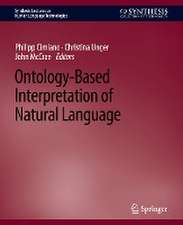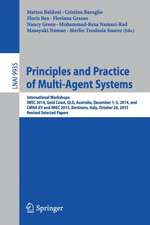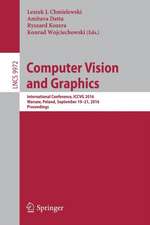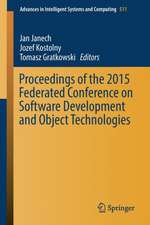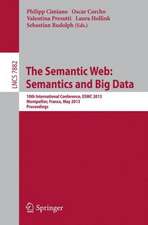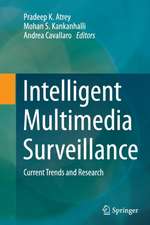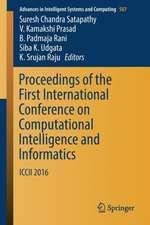Towards the Multilingual Semantic Web: Principles, Methods and Applications
Editat de Paul Buitelaar, Philipp Cimianoen Limba Engleză Hardback – 3 dec 2014
The Multilingual Semantic Web as envisioned in this volume will support the following functionalities: (1) responding to information needs in any language with regard to semantically structured data available on the Semantic Web and Linked Open Data (LOD) cloud, (2) verbalizing and accessing semantically structured data, ontologies or other conceptualizations in multiple languages, (3) harmonizing, integrating, aggregating, comparing and repurposing semantically structured data across languages and (4) aligning and reconciling ontologies or other conceptualizations across languages.
The volume is divided into three main sections: Principles, Methods and Applications. The section on “Principles” discusses models, architectures and methodologies that enrich the current Semantic Web architecture with features necessary to handle multiple languages. The section on “Methods” describes algorithms and approaches for solving key issues related to the construction of the Multilingual Semantic Web. The section on “Applications” describes the use of Multilingual Semantic Web based approaches in the context of several application domains.
This volume is essential reading for all academic and industrial researchers who want to embark on this new research field at the intersection of various research topics, including the Semantic Web, Linked Data, natural languageprocessing, computational linguistics, terminology and information retrieval. It will also be of great interest to practitioners who are interested in re-examining their existing infrastructure and methodologies for handling multiple languages in Web applications or information retrieval systems.
| Toate formatele și edițiile | Preț | Express |
|---|---|---|
| Paperback (1) | 648.26 lei 43-57 zile | |
| Springer Berlin, Heidelberg – 22 sep 2016 | 648.26 lei 43-57 zile | |
| Hardback (1) | 654.55 lei 43-57 zile | |
| Springer Berlin, Heidelberg – 3 dec 2014 | 654.55 lei 43-57 zile |
Preț: 654.55 lei
Preț vechi: 818.18 lei
-20% Nou
Puncte Express: 982
Preț estimativ în valută:
125.25€ • 131.10$ • 104.25£
125.25€ • 131.10$ • 104.25£
Carte tipărită la comandă
Livrare economică 31 martie-14 aprilie
Preluare comenzi: 021 569.72.76
Specificații
ISBN-13: 9783662435847
ISBN-10: 3662435845
Pagini: 320
Ilustrații: XV, 333 p. 83 illus., 32 illus. in color.
Dimensiuni: 155 x 235 x 20 mm
Greutate: 0.67 kg
Ediția:2014
Editura: Springer Berlin, Heidelberg
Colecția Springer
Locul publicării:Berlin, Heidelberg, Germany
ISBN-10: 3662435845
Pagini: 320
Ilustrații: XV, 333 p. 83 illus., 32 illus. in color.
Dimensiuni: 155 x 235 x 20 mm
Greutate: 0.67 kg
Ediția:2014
Editura: Springer Berlin, Heidelberg
Colecția Springer
Locul publicării:Berlin, Heidelberg, Germany
Public țintă
ResearchCuprins
Part Principles.- Overcoming Linguistic Barriers to the Multilingual Semantic Web.- Design Patterns for Engineering the Ontology-Lexicon Interface.- Context and Terminology in the Multilingual Semantic Web.- The Multilingual Semantic Web as Virtual Knowledge Commons: The Case of the Under-resourced South African Languages.- A three-dimensional paradigm for conceptually scoped language technology.- Towards Verbalizing Multilingual N-ary Relations.- Part Methods.- Publishing Linked Data on the Web: the Multilingual Dimension.- State-of-the-art in Multilingual and Cross-Lingual Ontology Matching.- Mind the cultural gap: bridging language specific DBpedia chapters for Question Answering.- Multilingual Extraction Ontologies.- Collaborative Management of Multilingual Ontologies.- From RDF to Natural Language and Back.- Multilingual Natural Language Interaction with Semantic Web Knowledge Bases and Linked Open Data.- A Cross-Lingual Correcting and Completive Method for Multilingual Ontology Labels.- A Cross-Lingual Correcting and Completive Method for Multilingual Ontology Labels.- Multilingual Lexicalisation and Population of Event Ontologies. A Case Study for Social Media.- Part Applications.- Semantically-Assisted XBRL-Taxonomy Alignment Across Languages.- Lexicalizing a multilingual ontology for searching in the Assistive Technology domain.- Service Oriented Architecture for Interoperability of Multi-Language Services.
Notă biografică
Dr. Paul Buitelaar is a senior research fellow and head of the Unit for Natural Language Processing of the Insight Centre for Data Analytics at the National University of Ireland, Galway. Before joining Insight (formerly DERI) in 2009, he was a senior researcher at the DFKI Language Technology Lab and co-head of the DFKI Competence Center Semantic Web in Saarbrücken, Germany. His main research interests are in the development and use of Natural Language Processing methods and tools for semantic-based information access.
Prof. Dr. Philipp Cimiano is full professor of computer science at the University of Bielefeld and leads the Semantic Computing group at CITEC. Prior to this, he was assistant professor at Delft University of Technology, where he worked in the Web Information Systems Group. He has published over 100 research papers in NLP, Ontologies, Knowledge Acquisition and Semantic Web and was nominated one of “AI’s 10 to Watch” by the IEEE Intelligent Systems Magazine.
Prof. Dr. Philipp Cimiano is full professor of computer science at the University of Bielefeld and leads the Semantic Computing group at CITEC. Prior to this, he was assistant professor at Delft University of Technology, where he worked in the Web Information Systems Group. He has published over 100 research papers in NLP, Ontologies, Knowledge Acquisition and Semantic Web and was nominated one of “AI’s 10 to Watch” by the IEEE Intelligent Systems Magazine.
Textul de pe ultima copertă
To date, the relation between multilingualism and the Semantic Web has not yet received enough attention in the research community. One major challenge for the Semantic Web community is to develop architectures, frameworks and systems that can help in overcoming national and language barriers, facilitating equal access to information produced in different cultures and languages. As such, this volume aims at documenting the state-of-the-art with regard to the vision of a Multilingual Semantic Web, in which semantic information will be accessible in and across multiple languages.
The Multilingual Semantic Web as envisioned in this volume will support the following functionalities: (1) responding to information needs in any language with regard to semantically structured data available on the Semantic Web and Linked Open Data (LOD) cloud, (2) verbalizing and accessing semantically structured data, ontologies or other conceptualizations in multiple languages, (3) harmonizing, integrating, aggregating, comparing and repurposing semantically structured data across languages, and (4) aligning and reconciling ontologies or other conceptualizations across languages.
The volume is divided into three main sections: Principles, Methods and Applications. The section on “Principles” discusses models, architectures, and methodologies that enrich the current Semantic Web architecture with features necessary to handle multiple languages. The section on “Methods” describes algorithms and approaches for solving key issues related to the construction of the Multilingual Semantic Web. The section on “Applications” describes the use of Multilingual Semantic Web based approaches in the context of several application domains.
This volume is essential reading for all academic and industrial researchers who want to embark on this new research field at the intersection of various research topics, including the Semantic Web, Linked Data, natural language processing, computational linguistics, terminology, and information retrieval. It will also be of great interest to practitioners who are interested in re-examining their existing infrastructure and methodologies for handling multiple languages in Web applications or information retrieval systems.
The Multilingual Semantic Web as envisioned in this volume will support the following functionalities: (1) responding to information needs in any language with regard to semantically structured data available on the Semantic Web and Linked Open Data (LOD) cloud, (2) verbalizing and accessing semantically structured data, ontologies or other conceptualizations in multiple languages, (3) harmonizing, integrating, aggregating, comparing and repurposing semantically structured data across languages, and (4) aligning and reconciling ontologies or other conceptualizations across languages.
The volume is divided into three main sections: Principles, Methods and Applications. The section on “Principles” discusses models, architectures, and methodologies that enrich the current Semantic Web architecture with features necessary to handle multiple languages. The section on “Methods” describes algorithms and approaches for solving key issues related to the construction of the Multilingual Semantic Web. The section on “Applications” describes the use of Multilingual Semantic Web based approaches in the context of several application domains.
This volume is essential reading for all academic and industrial researchers who want to embark on this new research field at the intersection of various research topics, including the Semantic Web, Linked Data, natural language processing, computational linguistics, terminology, and information retrieval. It will also be of great interest to practitioners who are interested in re-examining their existing infrastructure and methodologies for handling multiple languages in Web applications or information retrieval systems.
Caracteristici
First comprehensive overview of a research area encompassing various disciplines including Semantic Web and Linked Data technologies, natural language processing, computational linguistics, terminology and information retrieval The presentation covers the main foundational principles, methods and approaches to bring the vision of a Multilingual Semantic Web closer as well as showing its potential to solve real-world problems Paul Buitelaar and Philipp Cimiano are among the main drivers of the Multilingual Semantic Web, having organized several workshops on the topic at major conferences including the World Wide Web Conference and the International Semantic Web Conference Includes supplementary material: sn.pub/extras






